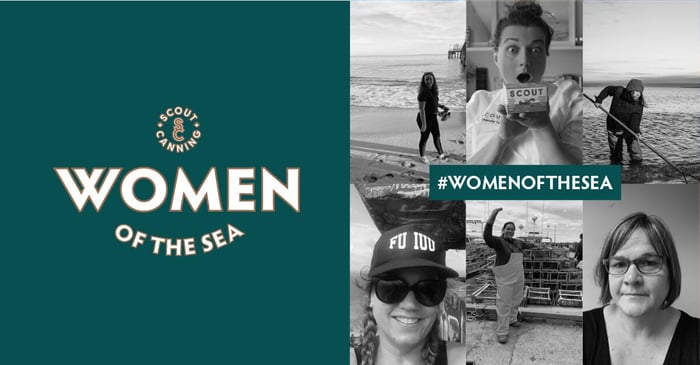Scout’s embrace for diversity in seafood industry for International Women’s Day
Mornings on a fishing boat are often associated with laborious work and a fair share of hypermasculine banter. Yet the machismo representation of the fishing industry might be nothing more than a facade. Historically speaking, the industry has been an all hands on deck experience, with many businesses fueled and navigated by resilient women.
“There are few women voices in this industry,” says Chef Charlotte Langley, co-founder and chief culinary officer of Scout. “It is important because we have been stewards of the sea for many, many centuries and our experience and tenderness is vital to the future of our oceans and waterways.”

Chef Langley’s role in the seafood industry picks up where many women left off. The Prince Edward Island-raised chef is closely tied into the business both on land and at sea, and even more importantly, she is recognized as a steward of the sea as the MSC Chef Ambassador to Canada.
“This industry is wild, engaging and changes every single moment of every single day,” says Langley when discussing her pulse on the changes within the seafood industry. “I am extremely engaged in the relationships, fishers and farmers that contribute to our global industry and community.“
Much of Scout’s fishing community that Langley refers to involves Acadian Supreme Inc., the Prince Edward Island seafood processor that Scout works with to produce their lobster, mussels, and trout products. Like many PEI natives, Lynn Rayner, operations manager, was brought up in a fishing community, but still sees much room for change within the industry when it comes to gender dynamics and perception.
“I still find that the seafood industry is a step behind most other industries in being what I would call it a ‘Man’s World,’” explains Rayner. “All meetings that I attend are mostly men but there are a few women popping into the scene.”
More women popping into the scene provides opportunity for the mentorship component within the industry, historically linked to the passing down of knowledge and skills to future generations—something that Scout clings to as they continue their ascent into the market.
“It's important to diversify leadership in all industries to be reflective and representative of different perspectives, lived experiences, and to provide mentorship and opportunities,” says Julia Hendra, director of sales at Scout.

Hendra’s commitment to sustainability and passion for business development falls in line with not just the ethos of Scout, but also the idea of intersectional environmentalism as a whole. The shared responsibility to protect both people and the planet is comorbid and essential for sustained progress. However, sometimes a guiding hand is necessary.
Julie Kuchepatov, founding director of SAGE (Seafood and Gender Equality) found her way into the industry from a very different angle. Kuchepatov started working with wild Atlantic salmon at a fly fishing lodge in Russia in the early 1990s. This experience ultimately determined her career path, leading to work in advancing environmental sustainability and social responsibility in fisheries and fish farms around the world.
With extensive experience in leadership roles within the likes of Fair Trade USA, Ocean Outcomes, and Wild Salmon Center, Kuchepatov recognized that there is an urgent need to give women a stronger voice within the seafood industry. In 2020, she launched SAGE to build women’s empowerment and gender equality in global seafood production and the sustainable seafood movement.
“50 percent of the people in global seafood production are women, however, we are seldom involved in decision-making discussions around the management of these precious resources,” says Kuchepatov. “In the U.S. seafood industry, there are only a handful of women CEOs in the leading seafood companies. SAGE is here to change that.

When women lead and their voices are heard, companies have a better bottom line, the industry becomes more attractive to a wider group of newcomers bringing innovation, and environmental improvements increase.”
Perhaps it starts with a tin of PEI mussels or a fly fishing adventure within a cold river, but if we want to continue consuming seafood for generations to come, we’ll need more perspectives at the table. Fish is the last hunted wild protein on the planet, with over 3 billion people relying on it as their food source, and a rapidly rising population on the way.
There’s still much work to be accomplished in building diversity within the seafood industry, but it must also be recognized that when tracing the successes within the industry, there is one constant: forward thinking, resilient women are at the helm.

